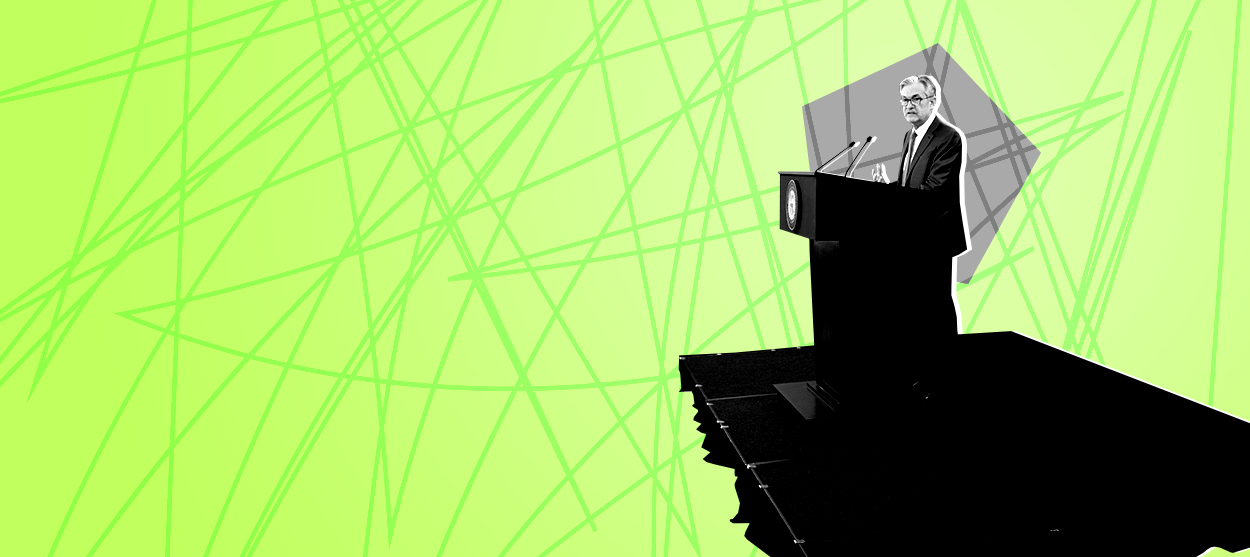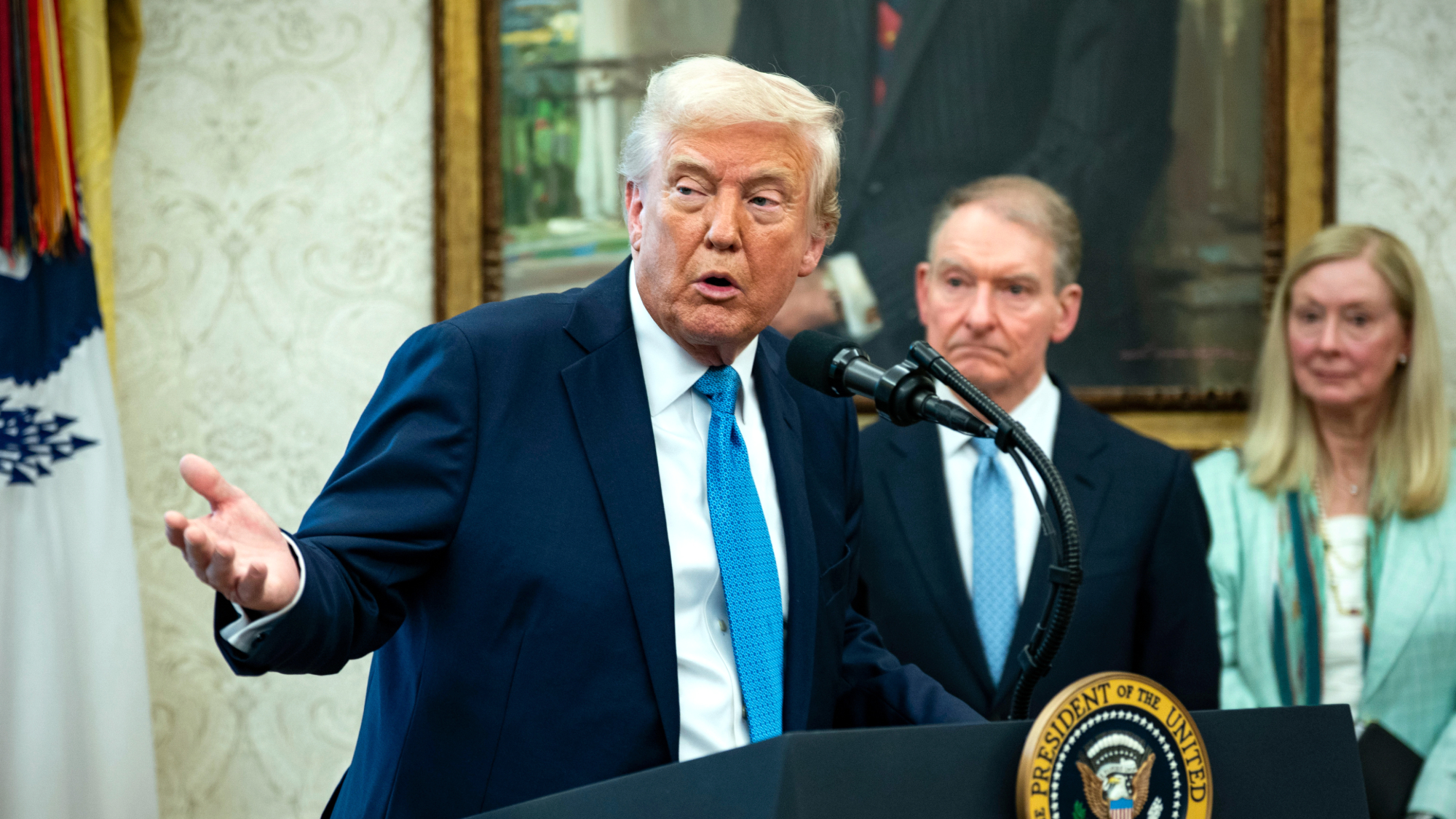A stock market plunge doesn't mean the Fed's emergency rate cut was wrong
There are plenty of misconceptions flying around here


A free daily email with the biggest news stories of the day – and the best features from TheWeek.com
You are now subscribed
Your newsletter sign-up was successful
On Sunday, the Federal Reserve cut interest rates a full percentage point, effectively reducing its target rate to zero. It also made several other emergency moves, all in an effort to defend the economy from the sweeping damage of the global coronavirus outbreak.
This morning, Monday, the stock markets dropped like a bunch of lead weights: The S&P 500, the Nasdaq and the Dow all more than 8 percent, falling so fast that automatic halts to trading were called. And this was on top of an already-brutal period for the markets.
You might assume this means the Fed's gambit didn't work. "Despite whipping out the big guns," Mizuho Bank's Vishnu Varathan wrote in a report, the Fed's moves are "falling short of being the decisive backstop for markets." Meanwhile, "markets might have perceived the Fed's response as panic, feeding into its own fears." Plenty of mainstream observers are also lamenting that the central bank is now "out of ammunition" to help the economy any further.
The Week
Escape your echo chamber. Get the facts behind the news, plus analysis from multiple perspectives.

Sign up for The Week's Free Newsletters
From our morning news briefing to a weekly Good News Newsletter, get the best of The Week delivered directly to your inbox.
From our morning news briefing to a weekly Good News Newsletter, get the best of The Week delivered directly to your inbox.
There are plenty of misconceptions flying around here, so let's try to clear them up.
Broadly speaking, every action the Federal Reserve can take falls into one of two categories: One, making cheaper loans easier to access for everyone in the economy, from businesses to individuals to financial trading firms. And two, making sure the financial markets have enough at-the-ready cash to keep trades flowing smoothly on a moment-to-moment basis.
In the first instance, the goal is to get more money into the economy: Cheaper credit makes it easier for people to consume, via more affordable credit card payments, mortgages, car loans, etc. Cheaper credit can also help plug holes in businesses' finances, brought on by real shocks to revenue. (Like, say, everyone staying home because of a massive viral outbreak.) The overarching goal is to prop up real economic activity, by increasing spending, and by preventing business closures and layoffs. The Fed's interest rate target adjustments achieve this, as does the $700 billion in new quantitative easing the Fed just announced.
In the second instance, the goal is to prevent a "run on the financial markets" similar to the bank runs of old. Basically, panics can seize up financial markets and end the flow of short-term trades. They can be driven by collapses in real economic activity, but they can also cause collapses in real economic activity. And they're part of what made 2008's Great Recession so devastating. Preventing such seize ups is what the $1.5 trillion of additional repo market purchases the Fed announced a few days ago were about.
A free daily email with the biggest news stories of the day – and the best features from TheWeek.com
None of this ties in directly to the stock market, which is basically a place to make speculative bets about which companies will be paying out the most dividends in the future, making their stock more desirable. Obviously, if stock traders anticipate a big collapse in real-world economic activity (hello again, coronavirus), stock prices are going to collapse — and presumably those traders are accounting for the central bank's latest actions in how bad they think things will get out there. But ultimately these remain speculative bets made by human beings. Basically, the Fed is trying to protect everyday commerce as best it can, which can have any number of effects on shareholder payouts that the stock markets may or may not properly anticipate.
The market dive is bad for people's retirement funds and savings, needless to say. But as a metric for judging the underlying economic realities, and how well the Fed is altering them, the stock market's uses are limited, to put it kindly.
What about the Fed being "out of ammunition?"
The central bank has never cut short-term interest rates — its biggest and most central tool — below zero before. Technically, it can. But it's not clear that negative rates translate into further economic stimulus as cleanly as lower-but-still positive rates. When it comes to quantitative easing, in which the Fed buys Treasuries and other financial assets in an effort to reduce longer-term interest rates, the sky's pretty much the limit. The Fed can keep creating money and buying stuff until either inflation picks up (which would mean the economy has recovered) or doomsday arrives.
Finally, the central bank could try something more dramatic, like totally changing how it targets inflation, or even whether it targets inflation versus some other metric (like nominal GDP growth). A lot of financial market behavior is built around anticipating the Fed's moves, so if the central bank announced it was changing its framework for how it does monetary policy, the markets' behavior will presumably change too — including changes to how cheaply credit is offered and when.
The problem, then, is not really that the Fed is running low on "bullets." It's more that all of its bullets are basically trickle-down stimulus. In the end, all the Fed can do is offer the economy more and cheaper debt. Companies may well take the loans, but whether they use them to protect shareholders, or to protect workers' jobs and pay, remains up to management. Furthermore, even at super-low interest rates, businesses can't keep borrowing forever, and lots of U.S. corporations are already neck-deep in debt. The same applies to individuals: Plenty of Americans are already in dire enough straits that they can't afford to buy a home or a car or take out another credit card regardless.
Ultimately, then, because of the limited tools it's permitted to use, there's only so much the Fed can do. What's really needed is for Congress and the president to step in with a big fiscal stimulus — the one tool that can get money to people and businesses that they don't ultimately have to pay back.
Still, the central bank can help at the margins. Granted, we will never know exactly how much it helped: We can't run an Earth 2 experiment with another global coronavirus outbreak, but where the Fed just sits on its hands. But we know what the general real-world effects of the Fed's choices will be. And the central bank was right to make the call it did.
Jeff Spross was the economics and business correspondent at TheWeek.com. He was previously a reporter at ThinkProgress.
-
 6 of the world’s most accessible destinations
6 of the world’s most accessible destinationsThe Week Recommends Experience all of Berlin, Singapore and Sydney
-
 How the FCC’s ‘equal time’ rule works
How the FCC’s ‘equal time’ rule worksIn the Spotlight The law is at the heart of the Colbert-CBS conflict
-
 What is the endgame in the DHS shutdown?
What is the endgame in the DHS shutdown?Today’s Big Question Democrats want to rein in ICE’s immigration crackdown
-
 The billionaires’ wealth tax: a catastrophe for California?
The billionaires’ wealth tax: a catastrophe for California?Talking Point Peter Thiel and Larry Page preparing to change state residency
-
 Bari Weiss’ ‘60 Minutes’ scandal is about more than one report
Bari Weiss’ ‘60 Minutes’ scandal is about more than one reportIN THE SPOTLIGHT By blocking an approved segment on a controversial prison holding US deportees in El Salvador, the editor-in-chief of CBS News has become the main story
-
 Has Zohran Mamdani shown the Democrats how to win again?
Has Zohran Mamdani shown the Democrats how to win again?Today’s Big Question New York City mayoral election touted as victory for left-wing populists but moderate centrist wins elsewhere present more complex path for Democratic Party
-
 Millions turn out for anti-Trump ‘No Kings’ rallies
Millions turn out for anti-Trump ‘No Kings’ ralliesSpeed Read An estimated 7 million people participated, 2 million more than at the first ‘No Kings’ protest in June
-
 ‘We must empower young athletes with the knowledge to stay safe’
‘We must empower young athletes with the knowledge to stay safe’Instant Opinion Opinion, comment and editorials of the day
-
 Ghislaine Maxwell: angling for a Trump pardon
Ghislaine Maxwell: angling for a Trump pardonTalking Point Convicted sex trafficker's testimony could shed new light on president's links to Jeffrey Epstein
-
 The last words and final moments of 40 presidents
The last words and final moments of 40 presidentsThe Explainer Some are eloquent quotes worthy of the holders of the highest office in the nation, and others... aren't
-
 IMF sees slump from tariffs, Trump tries to calm markets
IMF sees slump from tariffs, Trump tries to calm marketsSpeed Read The International Monetary Fund predicts the U.S. and global economies will slow significantly due to the president's trade war
